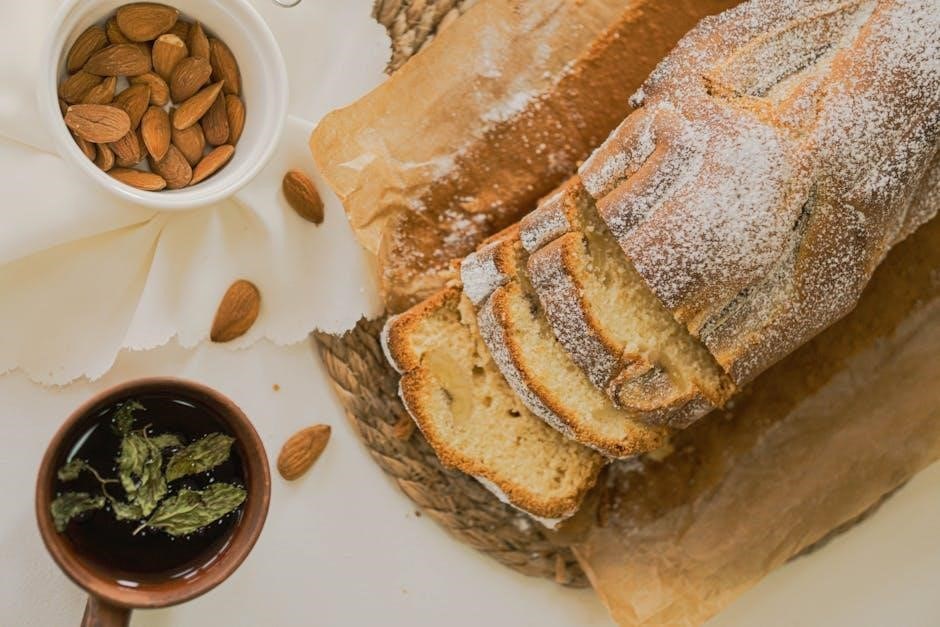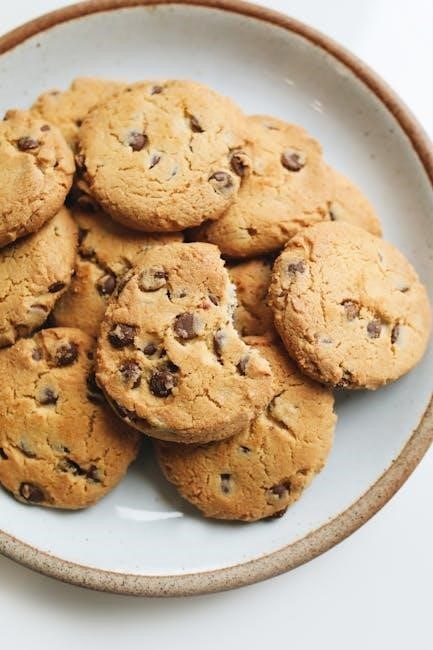no flour no sugar diet pdf
What is the No Flour No Sugar Diet?
The No Flour, No Sugar Diet eliminates refined carbohydrates and added sugars, focusing on whole foods to promote weight loss, blood sugar stability, and improved health outcomes.
What is the No Flour No Sugar Diet?
The No Flour, No Sugar Diet is a dietary approach that eliminates refined flours and added sugars, focusing on whole, nutrient-dense foods. It aims to reduce blood sugar spikes, promote weight loss, and improve overall health. By avoiding processed foods, the diet emphasizes lean proteins, vegetables, fruits, nuts, seeds, and whole grains like quinoa and brown rice. It encourages clean eating and mindful food choices.
Purpose and Philosophy Behind the Diet
The purpose of the No Flour, No Sugar Diet is to eliminate empty calories from refined carbs and sugars, reducing inflammation and blood sugar spikes. Its philosophy centers on clean eating, focusing on whole, nutrient-dense foods to promote weight loss, improve health, and reduce chronic disease risks. This approach supports a lifestyle of mindful eating and long-term wellness.
Benefits of the No Flour No Sugar Diet
The diet reduces blood sugar spikes and inflammation, promoting weight loss and improving overall health, while lowering risks of diabetes and heart disease.
Physical Health Benefits
The No Flour, No Sugar Diet promotes weight loss, stabilizes blood sugar levels, and reduces inflammation. It lowers the risk of chronic diseases like diabetes and heart disease. By eliminating refined carbs and added sugars, it improves insulin sensitivity and supports healthy digestion. This diet also enhances dental health by reducing sugar intake, which can prevent cavities and promote overall well-being. Regular adherence can lead to significant improvements in physical health.
Mental and Emotional Well-being
The No Flour, No Sugar Diet can improve mental clarity and reduce mood swings by stabilizing blood sugar levels. It often leads to increased energy and focus, enhancing overall emotional stability. Many participants report reduced cravings and a sense of accomplishment, boosting confidence and self-esteem. This diet fosters a healthier relationship with food, promoting long-term mental and emotional well-being.

Key Components of the Diet
The No Flour, No Sugar Diet focuses on eliminating refined flours and added sugars, emphasizing whole foods like lean proteins, vegetables, and whole grains for better health.
Foods to Avoid: Flour and Sugar
The No Flour, No Sugar Diet requires eliminating refined flours and added sugars. Avoid foods like white bread, pasta, pastries, and sugary snacks. Refined carbohydrates, such as those in pizza and donuts, are high in empty calories and fat. Always check food labels to identify hidden sugars and flours, ensuring a cleaner, healthier diet focused on whole ingredients.
Allowed Foods and Alternatives
The diet emphasizes whole, nutrient-dense foods like lean proteins, vegetables, fruits, nuts, seeds, and whole grains such as quinoa and brown rice. Alternatives to refined flour include Kernza and whole grains, while natural sugars from fruits are permissible in moderation. Healthy fats and fiber-rich options like legumes and tofu are also encouraged, providing balanced nutrition without compromising on flavor or satisfaction.

How to Start the Diet
Begin by planning meals and incorporating whole foods like lean proteins, vegetables, and whole grains into your diet. Stock your pantry with allowed foods, avoiding refined flour and added sugars. Educate yourself on hidden ingredients and consider meal prepping for convenience. Seeking support from communities or guides can also ease the transition and keep you motivated.
Meal Planning and Grocery Shopping
Planning meals for the week simplifies grocery shopping and meal prep. Focus on whole foods like lean proteins, vegetables, fruits, nuts, seeds, and whole grains. Avoid processed foods high in refined flour and sugar. Create a shopping list with alternatives like quinoa, brown rice, and natural sweeteners. Reading food labels helps identify hidden sugars and refined flours, ensuring compliance with the diet.
Essential Steps to Begin
Start by identifying and eliminating foods containing refined flour and added sugars. Plan meals around whole, nutrient-dense foods like lean proteins, vegetables, fruits, nuts, and whole grains. Read food labels to avoid hidden sugars and refined flours. Stay hydrated and consider meal prepping to maintain consistency. Gradually transition to avoid withdrawal symptoms and ensure a smooth start to the diet.
Meal Planning and Recipes
Plan meals incorporating whole foods like lean proteins, vegetables, fruits, nuts, and seeds, avoiding processed items. This approach simplifies grocery shopping and meal prep, promoting consistency.
Breakfast Ideas Without Flour and Sugar
- Vegetable Omelet: Whip up eggs with spinach, mushrooms, and bell peppers for a protein-packed start.
- Cottage Cheese Bowl: Mix cottage cheese with fresh berries and a sprinkle of chia seeds for a creamy, healthy option.
- Avocado and Egg Toast: Spread mashed avocado on a low-carb cracker and top with a fried or poached egg.
- Smoothie Bowl: Blend spinach, almond milk, and frozen berries, then top with nuts and shredded coconut.
- Stuffed Eggs: Fill hard-boiled egg halves with avocado or hummus for a quick, satisfying breakfast.
Lunch and Dinner Options
- Grilled Meats: Opt for chicken, fish, or turkey, seasoned with herbs and spices, served with a side of roasted vegetables.
- Vegetable Stir-Fries: Sauté a variety of colorful vegetables like broccoli, bell peppers, and zucchini with olive oil or coconut oil.
- Salads: Combine mixed greens, avocado, and lean proteins like grilled chicken or tofu for a satisfying meal.
- Legume Dishes: Prepare lentils, black beans, or chickpeas with spices and serve alongside steamed vegetables.
- Fish and Veggie Bowls: Pair baked or grilled fish with a medley of sautéed or roasted vegetables for a balanced dinner.
Challenges and Solutions
Cravings for sugary or flour-based foods can be tough to manage. Social gatherings and meals out often present obstacles due to limited options.
Common Challenges Faced
Adopting a no flour, no sugar diet can be challenging due to cravings, social pressures, and the inconvenience of meal planning. Many struggle with identifying suitable alternatives and navigating dining out. Transitioning from processed foods to whole ingredients can also lead to initial discomfort, such as withdrawal symptoms or feelings of deprivation. These challenges often test commitment and require strategic planning to overcome.
Strategies to Overcome Them
Success on the no flour, no sugar diet requires planning and creativity. Start by stocking your pantry with approved ingredients and finding healthy alternatives to favorite treats. Meal prepping can simplify decision-making and reduce temptation. Staying hydrated and incorporating physical activity helps manage cravings. Building a support network and setting realistic goals also aids in maintaining motivation and overcoming challenges effectively.

Lifestyle Changes to Support the Diet
Incorporate regular physical activity, stay hydrated, and prioritize quality sleep to enhance the diet’s effectiveness and overall well-being.
Exercise and Physical Activity
Regular physical activity, such as 30 minutes of daily exercise, complements the No Flour, No Sugar Diet by enhancing weight loss, improving blood sugar control, and boosting overall health. Pairing exercise with a balanced diet promotes sustained energy levels and supports long-term well-being, making it easier to maintain the dietary changes and achieve healthier lifestyle habits over time.
Hydration and Sleep
Staying hydrated is essential for overall health, aiding digestion and metabolism. Drinking plenty of water supports the body’s functions while on the No Flour, No Sugar Diet.
Quality sleep is crucial for recovery and appetite regulation. Aim for 7-9 hours nightly to maintain energy levels and support dietary goals effectively.
Scientific Evidence and Expert Opinions
Research indicates that reducing refined sugars and flours lowers risks of diabetes and heart disease, aligning with the diet’s principles and expert recommendations.
Studies Supporting the Diet
Research shows that diets low in refined sugars and flours reduce the risk of type 2 diabetes and heart disease. Studies from the American Heart Association and nutritional scientists highlight the benefits of eliminating empty calories, promoting weight loss and improved blood sugar control. Expert opinions endorse this approach for its focus on whole, nutrient-dense foods.
Nutritionist and Expert Views
Nutritionists and experts widely endorse the No Flour, No Sugar Diet for its focus on eliminating empty calories and promoting whole, nutrient-dense foods. Dr. Peter Gott and Dr. Walter Willett highlight its benefits for blood sugar stabilization, weight loss, and reducing chronic disease risks. Experts recommend this approach for its sustainable, long-term health improvements, emphasizing the importance of whole foods over processed alternatives.

Comparison with Other Diets
The No Flour, No Sugar Diet uniquely targets the elimination of refined carbohydrates and added sugars, distinguishing it from other diets like keto or low-carb plans.
Similarities and Differences with Other Diets
The No Flour, No Sugar Diet shares similarities with low-carb and keto diets by restricting refined carbs but differs by also eliminating added sugars. Unlike paleo, it doesn’t restrict grains entirely, focusing instead on whole foods. It aligns with clean eating but is more specific in targeting flour and sugar. This approach makes it unique yet complementary to other diets.
Which Diet is More Effective?
The No Flour, No Sugar Diet is highly effective for weight loss and blood sugar control, often outperforming other diets due to its focus on eliminating empty calories. Unlike keto or paleo, it doesn’t restrict entire food groups but targets harmful refined carbs and added sugars. This balanced approach makes it sustainable and adaptable for various health goals, complementing other diets while offering unique benefits.
Testimonials and Success Stories
Many individuals report significant weight loss, improved blood sugar levels, and enhanced energy on the No Flour, No Sugar Diet. Success stories highlight its effectiveness in transforming lives.
Real-Life Experiences and Results
Individuals share inspiring journeys on the No Flour, No Sugar Diet, reporting significant weight loss, improved blood sugar levels, and enhanced energy. Many highlight reduced cravings and better digestion. Some bloggers detail their challenges and triumphs, emphasizing the diet’s impact on overall well-being. Success stories often mention increased confidence and a sustainable lifestyle change, motivating others to adopt this transformative approach to eating.
Before and After Stories
Many individuals share dramatic transformations, highlighting significant weight loss and improved health markers. Before starting the diet, they often struggled with energy crashes and cravings. After adopting the No Flour, No Sugar approach, they report increased vitality, better digestion, and reduced inflammation. These inspiring testimonials showcase the diet’s life-changing potential, motivating others to embark on their own journeys toward healthier lifestyles and sustainable weight management.
Resources and Support
Access comprehensive guides like Dr. Peter Gott’s “No Flour, No Sugar Diet” report, offering detailed meal plans and expert advice to help you stay on track.
Books, Websites, and Communities
Dr. Peter Gott’s “No Flour, No Sugar Diet” report offers detailed guidance, while books like “Losing Weight” provide insights into clean eating. Websites and online communities share recipes, meal plans, and testimonials, fostering support and accountability. These resources empower individuals to navigate the diet effectively, ensuring sustained success and a strong support network for long-term health goals.
Support Groups and Forums
Online forums, social media groups, and local meetups provide invaluable support for those on the no flour, no sugar diet. Communities share recipes, challenges, and success stories, fostering motivation and accountability. Instagram and Facebook groups dedicated to clean eating offer tips and encouragement, while specialized forums address specific concerns, ensuring individuals feel connected and supported throughout their journey.
The No Flour, No Sugar Diet offers a sustainable path to better health by eliminating refined carbs and sugars, promoting weight loss, blood sugar stability, and overall well-being.
Final Thoughts on the Diet
The No Flour, No Sugar Diet is a powerful approach to improving health by eliminating refined carbs and added sugars. It supports weight loss, blood sugar control, and mental clarity. While challenging initially, the diet fosters long-term wellness by focusing on whole, nutrient-rich foods. Consistency and proper planning are key to maximizing its benefits and maintaining a balanced lifestyle.
Next Steps for Those Interested
Start by educating yourself with a comprehensive guide, such as the No Flour, No Sugar Diet book. Plan meals, shop for whole foods, and gradually eliminate refined carbs and sugars. Track progress, stay consistent, and seek support from communities or experts to maintain motivation and achieve long-term success on this transformative health journey.

